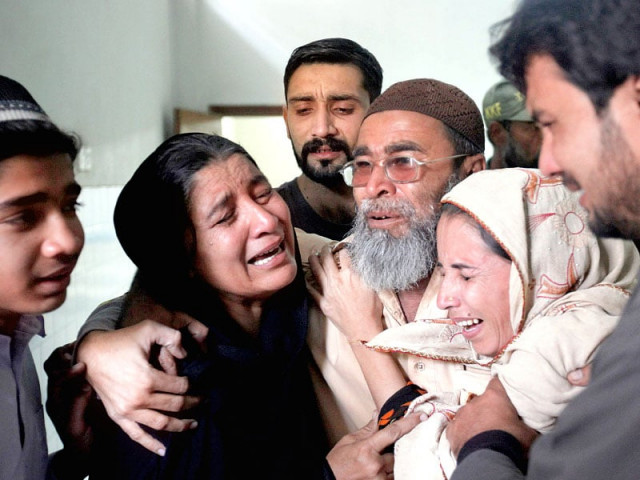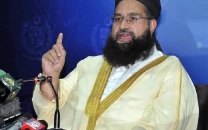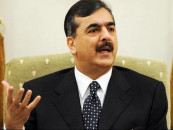Anti-polio campaign: In sync attacks on polio vaccinators
Four female workers shot dead in Karachi, one in Peshawar.

Five female health workers were shot dead on Tuesday in seemingly coordinated attacks at the start of a nationwide polio vaccination drive – raising fears for the safety of inoculators and highlighting resistance to a campaign highly politicised by the Taliban.
On the second day of the three-day vaccination campaign, four women were killed in less than an hour in Pashtun-dominated neighbourhoods of Karachi while a fifth worker, a teenager, was killed in Peshawar, police said.
The killings came a day after a man working on a government-World Health Organisation (WHO) project was shot dead in Karachi.
The shooting prompted a halt to the vaccination drive in Sindh. “The campaign has been stopped in the province with immediate effect,” said Sindh Health Minister Dr Sagheer Ahmed.
Madiha, 19, and Fahmida, 44, were the first two to be slain in the Gulshan-e-Buner area of Landhi. Within 15 minutes, Naseema Akhtar, was shot dead in Orangi Town, while her colleague, Israr, was critically injured in the attack.
Thirty minutes later, Kaneez Jan, was shot dead in Ittehad Town, while her coworker, Rashid, was injured in the attack.
At least 20 anti-polio teams, each comprising at least two members, kicked off door-to-door vaccination at 9am on Tuesday.
The two men injured in the attacks were the only eyewitnesses. Israr was unable to record his statement due to his precarious condition while Rashid failed to see the whole episode unravel. “It all happened so fast. All I saw was two masked men on motorcycles,” Rashid told The Express Tribune.
Lack of coordination
Initial investigation led the police to believe that the Tehreek-e-Taliban Pakistan (TTP) was behind the seemingly synchronised attacks.
DIG East Shahid Hayat blamed “the militants who have issued a fatwa (religious decree) against polio vaccination in the past” for the killings.
The victims were part of WHO-supervised polio vaccination teams, he said, adding that government and WHO officials were told to avoid taking such a risk without giving prior notice for approval.
“The girls who were killed in Landhi repeatedly asked for police assistance, but they were sent with assurances that they would be safe since they belonged to the area,” said Hayat.
DIG West Javed Odho also complained that organisers had failed to inform the police. Had the police known of the location and schedule of the planned activities, it would have sent personnel for sensitive areas, he added.
Hayat went on to add that a host of reasons could be attributed to the Pashtun community’s resistance to the vaccination campaign. The campaign is often condemned as a cover for espionage and more recently as a Western plot to sterilise Muslims, he said.
Peshawar attack
Meanwhile, a fifth worker, a teenager, was killed in Peshawar’s suburban Mathra area which borders the restive tribal areas – hotspots for polio and a haven for the Taliban who ordered a ban on polio vaccinations in June.
Farzana Bibi, 13, and her sister Amna, 19, were administering polio vaccinations in Shagai village when gunmen opened fire on them, killing Farzana.
She was driven to the Lady Reading Hospital in a critical condition, where she succumbed to her injuries, Dr Mumtaz Khan told The Express Tribune.
“We have no feud with anyone,” Farzana’s father said, adding that his daughter, Amna, was a fulltime polio worker, while Farzana worked part-time with her sister.
Police, however, claimed that the killing was the result of a rejected marriage proposal. “We have raided the house of the girl’s relatives who had proposed to her,” said an official of Mathra police station.
WHO suspends campaign
In a joint statement, the WHO and Unicef condemned the attacks and voiced their commitment to supporting Pakistan in its efforts to rid the country of polio and other diseases.
“Such attacks deprive Pakistan’s most vulnerable populations – especially children – of basic life-saving health interventions,” the statement said, while calling on officials to do their utmost to protect health workers.
The WHO, a partner in government efforts to eradicate polio, suspended vaccination activities “temporarily”, making it the second time this year that the programme has been put on hold.
“We advised the health department to stop the campaign after the incidents,” said WHO senior coordinator for polio eradication Dr Elias Durry.
However, despite the WHO directives, the district administration in Peshawar decided to continue the ongoing polio campaign. “The incident will definitely affect the ongoing anti-polio campaign but we will continue the drive to administer children that were the target of the sub-national immunisation days,” said Khyber-Pakhtunkhwa Deputy Director Expanded Programme on Immunisation Dr Jan Baz Afridi.
Tribal areas
Launching the vaccination campaign in the tribal areas on Monday, authorities threatened to punish tribesmen who refuse to allow their children to be inoculated.
Siraj Ahmad Khan, the top official in North Waziristan tribal area, said the punishments would include a ban on monthly stipends to tribal elders, development work, civil service recruitment and issuing ID cards and passports. (Additional input from Farhan Sharif in Karachi and AFP)
Published in The Express Tribune, December 19th, 2012.



















COMMENTS
Comments are moderated and generally will be posted if they are on-topic and not abusive.
For more information, please see our Comments FAQ